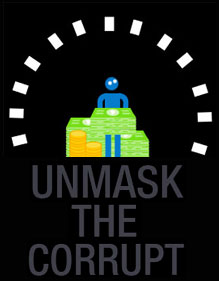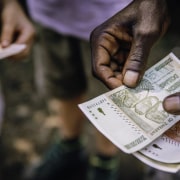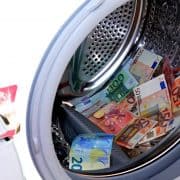|
Getting your Trinity Audio player ready...
|
 In South Africa, as in numerous other countries, corruption is a regrettable part of our everyday life, and it comes in various forms. But while anti-corruption laws exist, their implementation is not robust, and perpetrators are seldom punished.
In South Africa, as in numerous other countries, corruption is a regrettable part of our everyday life, and it comes in various forms. But while anti-corruption laws exist, their implementation is not robust, and perpetrators are seldom punished.
Those who engage in corruption are easily able to hide their ill-gotten gains by channelling the proceeds into offshore bank accounts, or by buying luxury goods such as extravagant cars, artworks, and large houses, which cost enough to hide, or launder, large sums of dirty money. And so the perpetrators of corruption live large and suffer no consequences for their actions.
Global anti-corruption NGO Transparency International (TI) says it’s time to put a stop to this culture of impunity. Today, 19 June, the organisation launched Unmask the Corrupt (UtC), a global campaign which urges governments to stop wrongdoers from using these channels to hide the billions of dollars gained through corruption.
UtC is a two-year initiative that forms a new aspect of the NGO’s broader international anti-impunity campaign. Existing activities in the campaign focus on, among others, the promotion of national judicial systems that are competent in preventing and punishing corruption.
The new campaign launched in Melbourne, Australia, with TI chairperson Huguette Labelle in attendance.
“By making it mandatory for business registers to include information about the ultimate beneficial owner and making that information public, G20 governments will help to ensure that law enforcement and the public know who really benefits from every company registered on their soil,” said Labelle. “It is time to unmask the corrupt who hide their identity and stolen wealth behind layers of secret companies and enjoy a life of luxury with impunity.”
Making a positive contribution
As a civil society organisation operating in a G20 nation, and an accredited national contact for TI, Corruption Watch is an active participant in the UtC campaign. Its two focus areas are beneficial ownership, and the acquisition of luxury goods.
The organisation has been asked to join 12 other TI chapters in piloting this campaign which will be extended across the globe in September. It’s planning a series of activities that includes engaging with government departments and agencies, identifying loopholes, making policy recommendations, and broadening the conversation around this issue.
“As a relatively new member of the TI family, we are determined to make a positive contribution to this important campaign,” said Corruption Watch’s executive director David Lewis. “While South Africa’s financial system is sophisticated and relatively well regulated, because it is so deeply inserted into the global financial system, it is also an attractive place to launder the proceeds of corruption and organised crime.”
There are several well documented cases of dirty money flowing into South Africa from other countries on the continent, added Lewis. ”I have no doubt that dirty money also leaves this country to reappear in difficult-to-trace bank accounts elsewhere or in the purchase of a luxury home in one or other European or North American city.”
He referred to the much-publicised arms deal, which has long been associated with talk of offshore accounts being used to hide the proceeds of bribery.
Hiding ill-gotten gains
A shell company is a legitimate, legal entity, but one that holds no assets, employs no workers and does no business – it has no physical presence. For the most part, it is used for valid purposes such as obtaining financing, but because it acts as a buffer between money passing through it, and the origin of the money, it is also ideal for facilitating illegal activities such as tax evasion and money laundering.
The ownership of a shell company is often anonymous and may easily be hidden without too much effort. Law enforcement agencies, therefore, will have no paper trail to lead them to individual or group perpetrators of corruption.
According to TI, the UtC campaign will target impunity for corruption at both the systemic and the individual level by reducing the ability of the corrupt and their accomplices to use and conceal assets that have been purchased using the proceeds of corruption.
It plans to do this by advocating, over its 24-month duration, for policy reforms aimed at exposing the ownership of secret companies and trusts, the favoured repositories of dirty money. It will also call for tighter regulation over the sale or transfer of luxury assets such as property, boats and cars.
At the systemic level, the campaign will demand the establishment of public registries of the beneficial owners of companies and trusts, and stricter regulation over the trade in luxury assets.
At the individual level, the campaign aims to limit perpetrators from taking their booty across the border, through more rigorous and transparent denial of entry processes to those suspected of corruption.
Making it difficult to hide the proceeds of crimes, says TI, will reduce the risk and incentive to steal public money on a large scale, or to solicit bribes and similar payments.
Beneficial ownership
A beneficial owner is the person who ultimately owns, controls or benefits from a company or trust fund and the income it generates. This is in contrast to a nominee company owner or trustee, who might be registered as the legal owner of an asset but doesn’t have the right to reap the benefits.
The beneficial owner, therefore, is the one that law enforcement agencies would look for, if corrupt activity is suspected.
TI says that a 2011 analysis by the intergovernmental Financial Action Task Force (on Money Laundering) showed that politicians and public officials can exploit corporate secrecy. For example, out of 32 international grand corruption cases scrutinised, in 17 instances the corrupt made use of shell companies to hide their ill-gotten gains.
And the World Bank reported in its publication The Puppet Masters that among 213 cases of grand corruption studied between 1980 and 2010, more than 70% showed that ownership of the stolen funds had been disguised through the misuse of corporate entities, half of which were anonymous shell companies.
TI makes several recommendations in this regard, such as the establishment of a central registry that collects beneficial ownership information and makes it public. As a first step it recommends the required disclosure of beneficial ownership by companies bidding for government contracts.
Luxury goods
TI reports that US$11.77-billion in foreign investment was spent on high-end London homes in 2013, and to put it into perspective, if just a small percentage of that outrageous sum is derived from corruption, the problem is huge.
The organisation suggests that governments enforce legislation requiring proper checks and due diligence on customers of the purveyors of luxury goods, such as art merchants and real estate agents.
It also recommends the stricter enforcement of regulations that require those who help set up the legal structures to hide dirty money – company lawyers, notaries, external accountants, and company and trust service providers – to certify as legitimate the sources of their clients’ money. This will ensure that corrupt money doesn’t go back into the system to re-emerge as apparently legally acquired luxury houses or pieces of expensive jewellery.
Governments should also adopt and enforce laws that prohibit real estate and associated financial brokers, and other high-end luxury goods dealers from accepting cash above a certain large amount, and to report anything suspicious.
By knowingly handling dirty money, these entities are often the enablers of corruption, and if they don’t comply with existing anti-money laundering rules, then they should be punished, says TI – governments should impose penalties that are severe enough to deter others.









